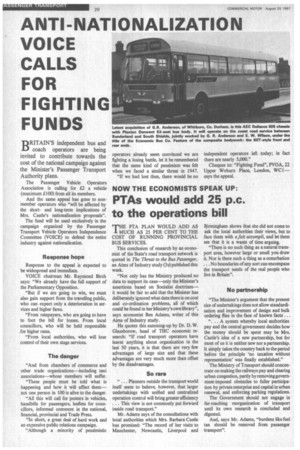NOW THE ECONOMISTS SPEAK UP:
Page 22

If you've noticed an error in this article please click here to report it so we can fix it.
PTAs would add 25 p.c.
to the operations bill
'T'HE PTA PLAN WOULD ADD AS IMIUCH AS 25 PER CENT TO THE COST OF RUNNING PROVINCIAL BUS SERVICES.
This conclusion of research by an economist of the State's road transport network is quoted in The Threat to the Ras Passenger, an Aims of Industry study (3 s) published this week.
"Not only has the Ministry produced no data to support its case—only the Minister's assertions based on Socialist doctrines— it would be fair to add that the Minister has deliberately ignored what data there is on cost and co-ordination problems, all of which could be found in her Ministry's own library", says economist Ben Adams, writer of this Aims of Industry study.
He quotes this summing-up by Dr. D. W. Glassborow, head of THC economic research: "If road transport operators have learnt anything about organization in the last 50 years, it is that there are very few advantages of large size and that these advantages are very much more than offset by the disadvantages.
So rare " ... Planners outside the transport world itself seem to believe, however, that larger undertakings with unified and centralized operation control will bring greater efficiency . . This view is not commonly put forward inside road transport."
Mr. Adams says of the consultations with local authorities which Mrs. Barbara Castle has promised: "The record of her visits to Manchester, Newcastle, Liverpool and
Birmingham shows that she did not come to ask the local authorities their views, but to face them with a fait accompli, and let them see that it is a waste of time arguing.
"There is no such thing as a natural transport area, however large or small you draw it. Nor is there such a thing as a conurbation . . . No boundaries of any sort can encompass the transport needs of the real people who live in Britain".
No partnership
"The Minister's argument that the present size of undertakings does not allow standardisation and improvement of design and bulk ordering flies in the face of known facts . .
". . . A system whereby local authorities pay and the central government decides how the money should be spent may be Mrs. Castle's idea of a new partnership, but for most of us it is neither new nor a partnership. It simply takes the country back to the period before the principle 'no taxation without representation' was finally established."
The Ministry of Transport should concentrate on making the railways pay and clearing urban congestion, partly by removinggovernment-imposed obstacles to fuller participation by private enterprise and capital in urban renewal, and enforcing parking regulations.
The Government should not engage in far-reaching reorganization of transport until its own research is concluded and digested.
And, says Mr. Adams, "burdens like fuel tax should be removed from passenger transport".












































































































